Transforming Leadership Through Stakeholder Centered Coaching
In a business landscape characterized by rapid changes and complex challenges, executives are required to continually refine their leadership approaches to maintain effectiveness. Stakeholder Centered Coaching is a highly effective and structured approach to executive coaching that was developed by Marhal Goldmith, #1 executive coach in the world, to help leaders achieve positive, lasting change in behavior for themselves, their people and their teams. It is a process that is focused not just on the leader who is being coached, but also on the stakeholders who are affected by the leader's behavior.
For leaders considering executive coaching, but feeling hesitant about this method, this article aims to demystify Stakeholder Centered Coaching, illustrate its proven benefits and provide strategies to effectively move forward.
Key Benefits of The Stakeholder Centered Coaching (SCC)
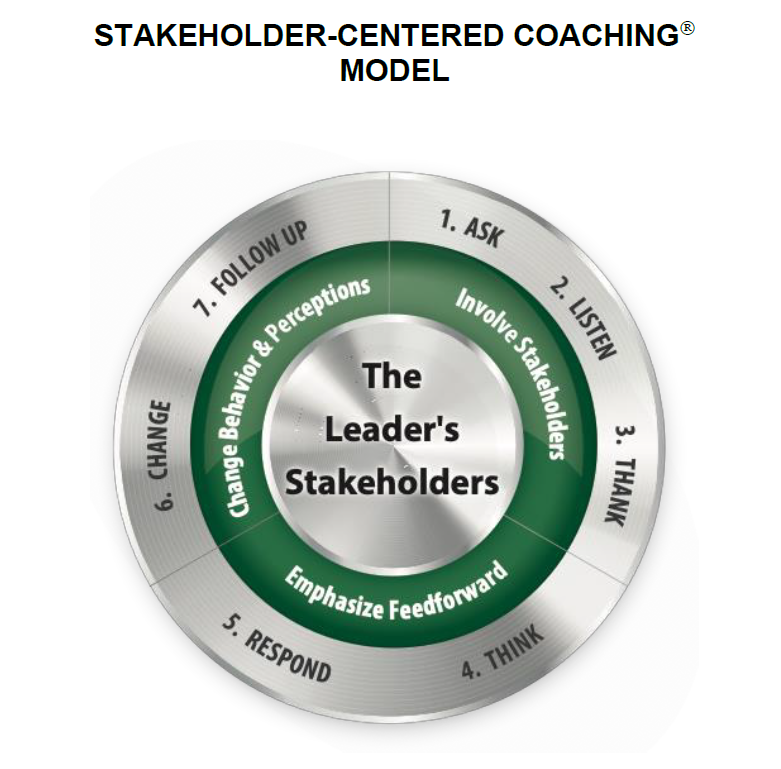
- Efficient and Accessible: Marshall Goldsmith's perspective that "Coaching is simple, but not easy!" aptly describes the straightforward yet impactful nature of SCC. This method is designed for busy leaders, providing a clear and practical framework that fits seamlessly into the demanding schedules without compromising the quality or depth of coaching engagements.
- Results-Oriented and Evidence-Based: SCC delivers measurable, observable results, directly linking leadership development to tangible improvements in performance. This approach not only involves stakeholders in verifying these improvements but ensures that every developmental step taken is aligned with both individual leadership goals and broader organizational objectives. This dual focus maximizes the relevance and impact of the coaching, contributing to a notable enhancement in organizational performance.
- Builds Trust and Promotes Alignment: By involving stakeholders in the coaching process, SCC fosters transparency and collaboration, building trust and ensuring that leadership actions are well-aligned with team and organizational expectations. This inclusivity enriches the coaching experience, offering leaders a well-rounded view of their impact and fostering a culture of continuous improvement and adaptive change, which is vital in dynamic business settings.

- Proven Success Among Global Leaders: The effectiveness of SCC is evidenced by its widespread adoption and success among global executives. This proven methodology has a track record of facilitating significant behavioral changes that enhance leadership efficacy and organizational outcomes.
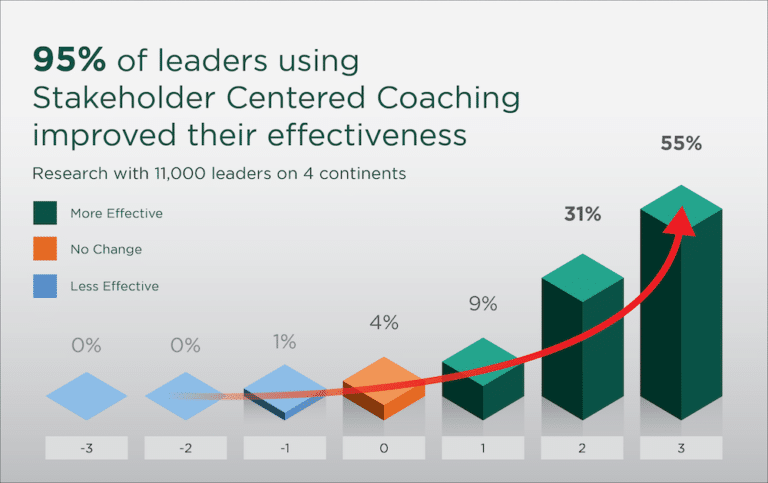
- Emphasis on Accountability and Customization: SCC stands out for its structured approach to accountability, with regular assessments and feedback loops integral to the coaching process. This ensures that leaders are not only aware of their development areas but are actively working on them, with clear accountability for progress. Additionally, the adaptability of the SCC framework allows it to be customized to the specific challenges and goals of any organization, making the coaching highly relevant and directly impactful on both personal and organizational levels.
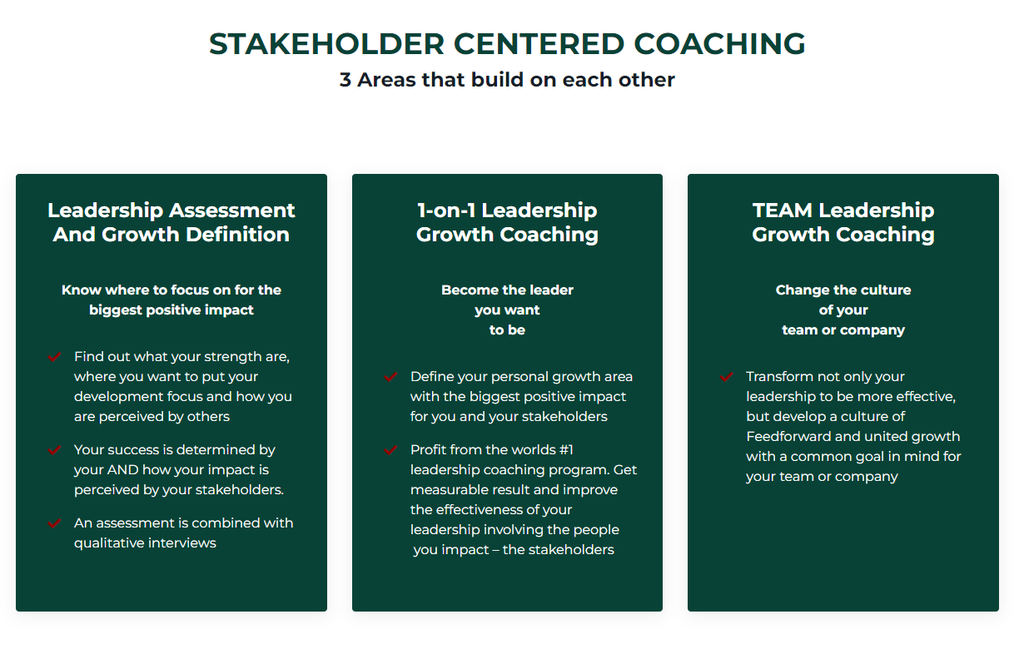
Understanding the Roots of Resistance
As leaders embark on their development journeys, recognizing and navigating the potential barriers that can arise is crucial. Resistance to change is often deeply rooted in a natural human inclination to seek comfort in the familiar and predictable. Psychological research suggests that such resistance is not merely a stubborn refusal to adapt but a complex interplay of cognitive and emotional factors.
Key Psychological Barriers:
- Fear of Vulnerability: Leaders often worry that acknowledging weaknesses will undermine their authority or credibility. According to research by Brene Brown, vulnerability is actually a strength in leadership, as it fosters trust and openness, enhancing team dynamics and innovation. However, the initial discomfort can deter leaders from stepping into this vulnerability.
- Skepticism of New Approaches: Leaders may doubt the efficacy of new methods, especially when traditional, time-tested strategies have previously brought success. This skepticism is often supported by a cognitive bias known as the status quo bias, where individuals prefer things to remain the same by overemphasizing the risks of change compared to potential benefits.
- Loss of Control: Adapting to new behaviors can trigger a fear of losing control over one’s established leadership style. This is linked to the psychological concept of autonomy, which is a fundamental human need. Changes perceived as imposed can lead to reactance, a psychological response wherein individuals resist to regain their sense of freedom.
- Cognitive dissonance: When new information conflicts with existing beliefs, it may cause discomfort. Leaders are thus more likely to resist new practices that contradict their current understanding of effective leadership. This dissonance can be managed through careful framing of the change process, ensuring leaders see the alignment with their core values and long-term goals.
By addressing these psychological barriers with informed strategies, leaders can more effectively navigate the complex landscape of change, turning resistance into a catalyst for growth and innovation.
Strategies to Navigate Resistance
To effectively address and overcome these hesitations, leaders can adopt several strategic approaches that not only mitigate the psychological discomfort associated with change but also harness it to enhance leadership effectiveness.
- Embrace Vulnerability as a Leadership Strength:
- Vulnerability is not merely a sign of openness but a bold act of courage. Brené Brown emphasizes that vulnerability is the birthplace of innovation, creativity and change. When leaders embrace their vulnerabilities, they are not showing weakness but rather courageously acknowledging their humanity. This act of authenticity transforms perceived weaknesses into significant opportunities for growth and learning. By being vulnerable, leaders enhance their approachability and credibility, fostering an atmosphere of trust and mutual respect within their teams. This shift can profoundly influence the organizational culture, encouraging a more engaged, collaborative, and supportive work environment where everyone feels valued and empowered to contribute their best.
- Constructive Perspective on Feedback:
- Feedback is a powerful tool for professional growth when viewed constructively rather than as criticism of past actions. This shift in perspective can transform the feedback process into a proactive strategy for achieving strategic goals. Leaders who embrace feedback as essential insights gain a dynamic tool for driving their development forward, cultivating a resilient culture of continuous improvement within their organizations. By actively seeking and valuing feedback, leaders not only adjust their course more effectively but also demonstrate a commitment to personal excellence and organizational success.
- Valuing Diverse Insights:
- Incorporating diverse perspectives into the decision-making process is vital for comprehensive leadership. Engaging a broad range of stakeholders in the feedback process deepens a leader’s understanding of their influence and reveals opportunities and challenges that may not be immediately apparent. This diversity fosters innovation and enhances decision-making, as varied viewpoints offer a richer, more nuanced understanding of situations. Leaders who value and integrate these insights are better equipped to make informed decisions that reflect the complexities of modern business environments.
- Building Confidence Through Accountability:
- Accountability is crucial in translating leadership intentions into actions. Stakeholder Centered Coaching emphasizes structured follow-ups that turn developmental commitments into tangible outcomes. This consistent engagement not only supports leaders by building a network of feedback and encouragement but also reinforces their confidence. As leaders see real progress from their efforts, their commitment to their personal and professional growth strengthens, establishing a cycle of positive reinforcement and continuous advancement.
5. Trust the Process and Proven Methodology:
-
- Trusting a methodology with a proven track record of success can alleviate the fear of the unknown. Executives can take comfort in knowing that 95% of leaders who went through the SCC process improved their leadership effectiveness. Witnessing the tangible results achieved by leaders globally can reinforce the value and potential impact of engaging fully with the coaching process.
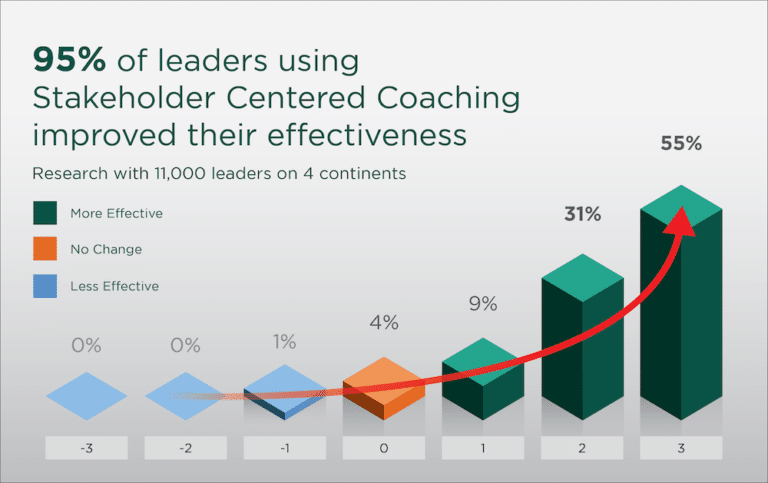
MG Stakeholder Centered Coaching Process
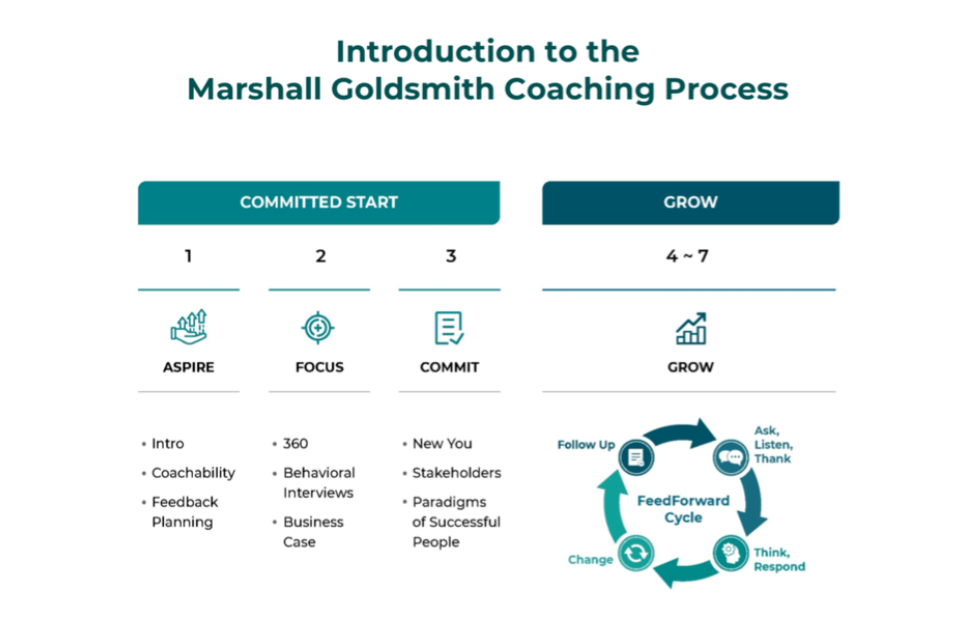
Step 1: Define Leadership Development Goals
- Goal Identification: The leader identifies specific leadership behaviors or skills they aim to improve. These goals should be closely aligned with both personal leadership needs and organizational objectives.
- Alignment with Organizational Vision: The coach and the leader ensure these goals are in sync with the broader strategic aims of the organization, enhancing relevance and impact.
Step 2: Engage Key Stakeholders
- Selection of Stakeholders: Identify a diverse group of stakeholders who regularly interact with the leader. These should include direct reports, peers, and supervisors to cover a broad spectrum of perspectives.
- Clarification of Roles: Communicate to the stakeholders their role in the coaching process, which includes providing honest, constructive feedback and participating in regular follow-ups.
Step 3: Assessment and Feedback Collection
- Initial Assessment: Conduct initial assessments to establish a baseline of the leader’s current behaviors and skills. This often involves 360-degree feedback mechanisms.
- Feedback Compilation: Gather and compile feedback from all selected stakeholders, providing the leader with a comprehensive view of their current leadership impact.
Step 4: Action Planning and Implementation
- Development of an Action Plan: The leader, with the guidance of the coach, creates a detailed action plan based on the feedback received. This plan outlines specific steps and strategies to address the feedback and reach the leadership development goals.
- Implementation: The leader implements the strategies and changes outlined in the action plan, actively working on the behaviors that have been identified for improvement.
Step 5: Regular Progress Reviews and Adjustments
- Ongoing Interaction with Stakeholders: Regularly engage with stakeholders to discuss progress and gather ongoing feedback. This continuous loop helps the leader adjust their behavior in real-time and keeps the stakeholders actively involved in the process.
- Adjustments to the Action Plan: Based on ongoing feedback, the action plan may be adjusted to better suit the leader’s development needs or to address additional areas as they emerge.
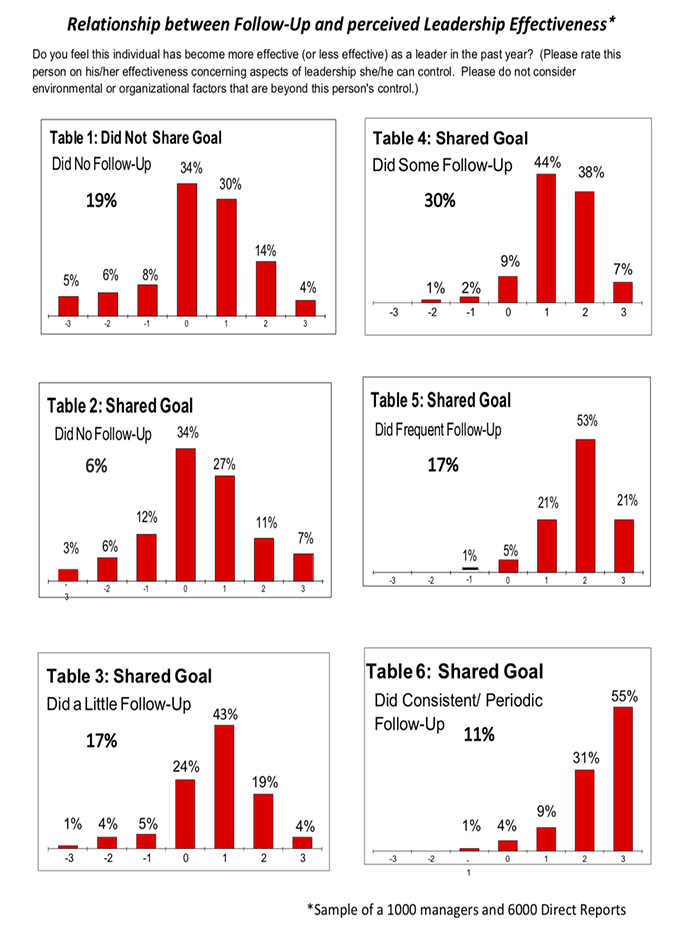
Step 6: Measure Improvement and Impact
- Follow-Up Assessments: Conduct follow-up assessments at designated intervals to measure the leader’s improvement over time against the baseline established initially.
- Evaluation of Impact: Assess the tangible impact of the changes on the leader’s effectiveness and on organizational performance.
Step 7: Consolidation and Future Planning
- Consolidation of Gains: Ensure that improvements are maintained and that the leader continues to use the new skills and behaviors effectively.
- Planning for Continued Development: Discuss future goals and areas for continued improvement, potentially expanding the scope of coaching or focusing on new leadership capacities.
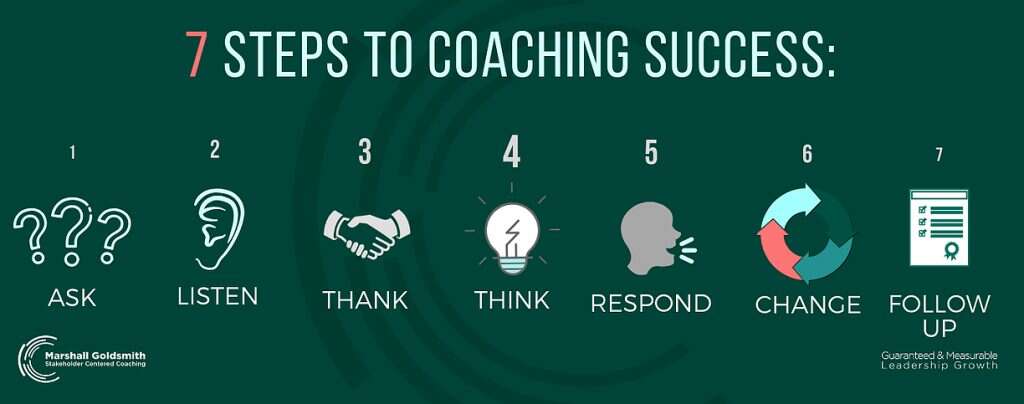
This structured approach ensures that leadership development is comprehensive, continuous and closely aligned with real-world feedback and organizational needs, making SCC a powerful tool for transformative leadership enhancement.
Whether you're just beginning to consider SCC or are ready to dive deeper into its process, remember that the journey toward leadership excellence is ongoing and always evolving. By engaging in SCC process you are taking the definitive step towards not just meeting but exceeding the expectations of your role and reshaping your organizational culture for the better.
Download Our Brochure "Transforming Leadership through Stakeholder Centered Coaching"



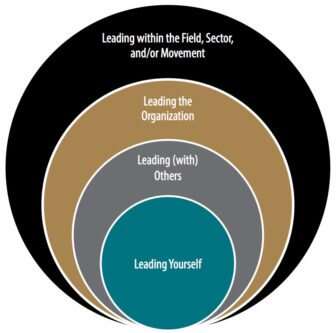 this deep reflective exercise.
this deep reflective exercise.